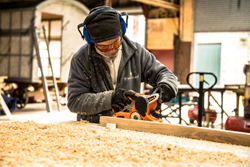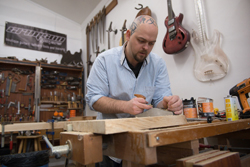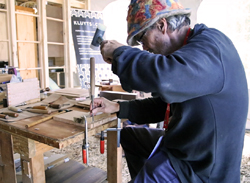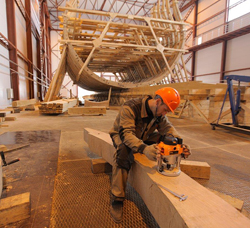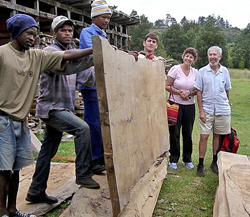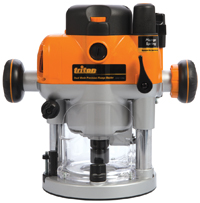
Over the past year or so, Steve Hewson, brand manager for Triton(R) Precision Power Tools, has logged a lot of frequent flyer miles through his travels for the company. But not all of those trips have been to the usual trade show venues or in order to visit Triton distributors around the UK, where the company is based, or abroad. Many of his trips have taken him to far-flung locations and right into the shops of those who use Triton power tools in unique ways to do their work. The purpose is simple: Steve and Triton want to help tell their customers’ stories to a larger online audience as a way of encouraging other aspiring and long-time “makers.” And they’re channeling this coverage into a blog that was begun last January.
“Starting with a program which kicked off at the end of 2013, we began a program to change the imagery in our catalogs and online to reflect more real-world use of our tools. Real guys using the products on real projects … We began to really concentrate on creating unique and compelling content to show the possibilities of woodworking both for professionals and makers or hobbyists,” Hewson says.
Part of the reasoning for Triton’s new initiative is economic. The power tool market is a crowded industry with many brands pursuing essentially the same customers. Increasingly, that target audience for premium brand tools is contractors and professional users. However, many of those users are already “wedded” to their chosen brands, Hewson says, and it’s difficult to convince them that there are other alternative tool choices, like Triton.
But, Triton has also realized that an important segment of tool users — often called “makers” in today’s parlance — are being underserved by the over-advertised and contractor-focused mainstream tool brands. Makers’ stories aren’t being told, and their unique and interesting approaches to using tools should be encouraged.
Hewson says that since Triton was founded in 1976, its product line of woodworking power tools and other workshop accessories, has been marketed mostly to the “mature woodworker,” aged 55 and above and semi-retired or retired with disposable income to support a woodworking pastime. But, the company sees a growing movement of young people toward hobbies that include some form of making. They use social media instead of books or magazines as a primary learning vehicle, and they may not have benefited from formal tool education in school. Hewson says they are skeptical of traditional advertising and unsupported claims, and they aren’t necessarily brand-loyal or “designer label” oriented. They want their projects to express their own unique creativity and gain the satisfaction that comes from genuinely making things for their homes, friends and family.
“Our aim is to connect with those younger people who have already decided that making is what they want to do, as well as an even younger crowd who are looking for some creative outlet but as yet are undecided about what that should be. We think it could involve at least some element of woodworking,” Hewson adds.
Triton’s new blog, which is gaining traction with online audiences, contains a variety of content that ranges from original video footage and interviews to book reviews that Triton hopes makers will find appealing. “Some people we talk to (for the blog) make no use of power tools at all,” Hewson says. “In our ‘Best of the Web’ feature, our stories relate to great design, art or craftsmanship.”
For instance, Steve says one impressive young maker is Ben Crowe, an English woodworker who was classically trained as a luthier. Crowe has redirected his craft to focus on custom-made electric guitars, and he’s garnered an online audience of aspiring guitar builders who watch his YouTube shows for hints and tips on how to build the ultimate custom guitar.
“Ben is on something of a mission as well,” Hewson adds. “Not only to build the best guitars he can, but to share and support others to do so. He has a workshop with three apprentices and offers training for others to come along and get some hands-on experience.”
Recently Ben created a special “Triton Conspiracy Custom Guitar” that Hewson says embodies the spirit of the brand. You can learn more about this unique instrument by clicking here.
Or, Steve recalls a recent visit to Blackdown Shepherds Huts in South Somerset, England. There, two craftsmen are reinventing the concept of temporary shelters for shepherds, which have been used for hundreds of years, into contemporary living spaces, complete with bathrooms, kitchens and sleeping quarters. Their huts are being used for home offices, luxury saunas and holiday retreats. Hewson adds, “Their commitment to quality rather than compromise to meet costs was very refreshing.”
Of course, makers aren’t just twenty-somethings or craftspeople with novel ideas; the desire to build crosses generational lines. The Triton blog also supports seasoned woodworkers such as Charles Beresford, a fine furniture maker whose work focuses almost exclusively on hand tool use and manufacture. He teaches his students how to make fine hand planes and has, in Hewson’s estimation, an almost religious passion for sharpening. “Charles is a rare individual not only in his ability to master his craft to a very fine level, but also to be able to share that experience and passion in a way that is infectious and inspiring.” Hewson’s interview with Beresford will be appearing on Triton’s blog soon.
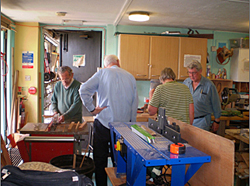
Even makers in the “autumn” of their avocations have stories to tell, and they benefit from shared social experiences. That’s why Triton has supported the Men’s Shed movement. Its focus is to give men over the age of 50 a place to meet other makers, socialize and build projects that might include woodworking, metalworking, model-making and photography. The intention is to curb the tendency of men in later life to isolate themselves in their shops after they retire and lose contact with coworkers and colleagues. “Triton was involved in the early days of the Men’s Shed movement in Australia, and we continue to provide some sponsorship support to the UK association,” Hewson says.
Triton’s blog coverage will continue to be far-reaching, too. One features a Triton distributor in Russia that has been involved on a sponsorship basis with the construction of an all-wood Russian fighting ship. Another upcoming blog post will focus on Timber Village, a grassroots furniture-building initiative in Knysna, South Africa, where local craftsmen build made-to-order furniture from exotic and indigenous woods. “Part of the work they do at Timber Village includes the sponsorship and training of local young people to meet the skills needed for the long-term future of their projects and the industry,” Hewson says.
Whether a maker is creating custom surfboards, one-of-a-kind guitars or precision hand planes, Hewson sees the core motivation for that effort to be the same: people increasingly are looking to enrich their lives with experiences and investing their time to make projects that give them a tangible reward for their efforts. Woodworking is an ideal medium for makers, because even rudimentary skills and a few tools can produce meaningful projects.
“Manufacturers that recognize their tools are just as likely to be used by a novice as they are a seasoned professional, will innovate to make complicated processes easier and provide inspiration to get involved. (They) will find a receptive consumer in this emerging maker generation. This is our philosophy at Triton, for sure.”

